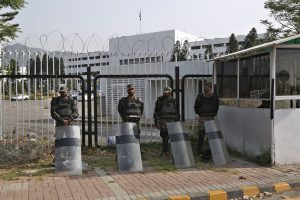Pakistan’s political and constitutional crisis deepened on Sunday when the Deputy Speaker of the National Assembly rejected the opposition parties’ no-confidence motion against Prime Minister Imran Khan on the basis that it was foreign-funded and unconstitutional.
Shortly after the deputy speaker’s rejection of the resolution, Khan dissolved the assembly and called for fresh elections. The opposition was left fuming and announced that it would fight the issue in the Supreme Court.
The Supreme Court’s top judge, Justice Umar Ata Bandial, who took suo motu notice of the development late on Sunday, said that all directions issued by Khan and President Arif Alvi would be subject to the court’s orders.
Khan’s move was unexpected as constitutionally, a no-confidence motion cannot be rejected. As per the Constitution of Pakistan, the parliament is bound to conduct voting on the motion and as long as the process has not been completed, the prime minister cannot dissolve assemblies.
I had argued in my last article that Khan would do everything he can to delegitimize the no-confidence motion. Arguably, the government used the alleged link of the no-confidence motion with a foreign conspiracy as a reason to reject it, meaning that once the motion was rejected, Khan was able to dissolve the assemblies. But can this decision stand in the apex court? We will have to wait and see.
Commenting on the issue, Pakistan’s National Security Committee (NSC) said last week that there was a “formal communication” between a foreign country’s official and a Pakistani diplomat in which “undiplomatic” language was used to convey a message. The NSC decided that “the communication amounted to blatant interference in the internal affairs of Pakistan by the country in question.” It decided to issue “a strong demarche to the country in question both in Islamabad and in the country’s capital through proper channel in keeping with diplomatic norms.”
My sources in Islamabad confirm that it was merely a candid conversation in which two sides exchanged views and it was duly reported by Pakistan’s ambassador. However, Khan, seeing no other way out to save his government, weaponized the communication to an extent that he used it to subvert the constitutional process.
On Sunday evening, the prime minister went as far as saying that the evidence of the conspiracy was accepted by the NSC. “When the country’s highest national security body confirms this, then the [parliamentary] proceedings were irrelevant, the numbers were irrelevant,” Khan said.
At the moment, Pakistan doesn’t have a government and the country’s political leadership remains deeply divided. The Supreme Court’s ruling over the issue has gained huge significance as the top court’s decision, which is expected to be announced later today, will determine the future of Pakistan’s constitutional politics.
While Khan may have created a popular narrative out of a non-issue involving alleged foreign intervention to remove his government, his lawyers will make a passionate case in the top court by calling in evidence from the NSC meeting and other forums. What is clear is that his government doesn’t have any evidence beyond a meeting between a Pakistani diplomat and a senior foreign official, meaning that the alleged conspiracy is far from proven. Will the apex court ask for an investigation into the issue? Any such move will take time and may remain inconclusive as the military would not want the issue to be brought to the court as it may have foreign policy implications for the country.
Constitutional experts say that the deputy speaker’s move to reject the no-confidence motion should be overruled by the top court. But it is unclear if the court will go as far as reversing Khan’s decision to dissolve assemblies and order for the vote’s completion in the parliament.
At this point, things have heated to an extent that the threat of violence looms large regardless of what the top court rules. If it decides to reverse the prime minister and deputy speaker’s ruling, the ruling Pakistan Tehrik-e-Insaf and its support base are not likely to accept it. The party’s base is highly charged as they see Khan as a victor who defeated an international conspiracy.
On the other side, the opposition may not accept the top court’s ruling if Sunday’s decisions are not reversed. Moreover, the top court’s decision will be important as it will decide if any future no-confidence motions in the national assembly can stand, or be thrown out under accusations of foreign intervention.
All eyes are on the Army. An intervention is expected to clear the political mess created by the prime minister. So far, the military has managed to stay away from the issue. “Army has nothing to do with the political process,” the military’s media wing told Reuters on Sunday.
Pakistan’s political and constitutional crisis has just begun and the existing turmoil will deepen further in the coming days.

































